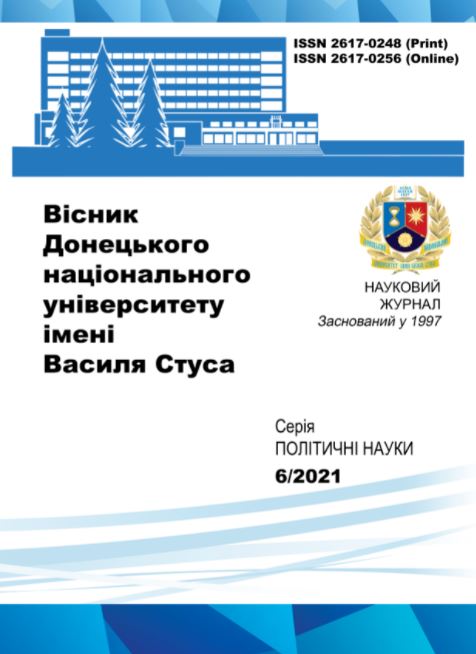Restrictions of religious freedom and the implementation of neo-militant democracy rule in crisis-driven Poland
DOI:
https://doi.org/10.31558/2617-0248.2021.6.8Keywords:
Poland; the Catholic Church; religious freedom; pandemic; neo-militant democracyAbstract
The coronavirus pandemic is another crisis in Europe that has exposed anti-democratic tendencies in the Member States of the European Union. It took place immediately after the financial crisis and the so-called refugee crisis that previously revealed such a trend. During the coronavirus pandemic, the governments have imposed a lot of different restrictions, inter alia on freedoms of peaceful assemblies, movement, or religious freedom, which may indicate the implementation of the neo-/quasi-militant democracy rule in the analyzed country. In this article, I focus only on the limitations liked to the Catholic Church. The restrictions imposed by the government mainly concerned the limited number of people who can participate in church rites and restrictions on movement for young people. In response to the introduced restrictions, there were very divided voices of clergy representing the Catholic Church. On the basis of their analysis, the positions held were classified into four groups that allow me to organize and classify the attitude of individual clergy to the introduced restrictions. The statements of the clergy were divided into those expressing approval for the introduced restrictions, denying them, expressing doubts (partial approval or negation) as well as an attitude expressing openness to the use of modern technologies in evangelization or lack of support for their use. The study revealed that religious freedom in Poland was significantly violated during the coronavirus pandemic. It was a mechanism characteristic of neo-militant democracy since the democratic freedom was restricted not to limit the sovereignty of the Polish political nation. However, the results obtained do not indicate the progressive process of neither neo- nor quasi-militant democracy rule implementation, because the restrictions appeared only during the pandemic and also covered other institutions, for example schools and universities. Earlier, before the pandemic period, one can rather talk about incidental actions limiting religious freedom. In addition, the restrictions introduced were not as restrictive for the Church as in the case of other institutions.
References
Rezmer-Płotka K. The effects of crises in the European Union as a manifestation of the militant democracy rule implementation. Przegląd Prawa Konstytucyjnego, 2020, Vol. 58, No. 6. 615–621.DOI: 10.15804/ppk.2020.06.50.
Rak, J. Self-Defense Mechanisms of Democracy during the Crisis: The Baltic States in Comparative Perspective. HAPSc Policy Briefs Series, 2021. Vol. 1, No. 2. 17–23. DOI:https://doi.org/10.12681/hapscpbs.27647.
Możgin W. The Perspectives of Human Freedom in a Post-Pandemic Social Reality. Ukrainian Policymaker. 2020, Vol. 6, No. 6, 63–73.
Androutsopoulos G. The Right of Religious Freedom in Light of the Coronavirus Pandemic: The Greek Case. Laws, 2021. Vol. 10, No.1. DOI: https://doi.org/10.3390/laws10010014.
Osiewicz P. Limitations to the Right to Freedom of Assembly in Poland during the COVID-19 Pandemic: The Case of Women’s Strike. HAPSc Policy Briefs Series, 2020. Vol. 2, No. 1. 195–200. DOI: https://doi.org/10.12681/hapscpbs.26458.
Skrzypek M. The Banning of Extremist Political Parties as a Measures of Neo-Militant Democracy: The Experience of Post-Communist States. HAPSc Policy Briefs Series. 2020. Vol. 2, No. 1. 67–73. DOI: https://doi.org/10.12681/hapscpbs.26450.
Rak. J., Bäcker R. Trajektoria trwania opancerzonych demokracji. Studia nad Autorytaryzmem i Totalitaryzmem. Vol. 3, No. 41. 63–82. DOI: http://dx.doi.org/10.19195/2300-7249.41.3.5.
Rapporteur’s Digest on Freedom of Religion od Belief. Excerpts of the Reports from 1986 to 2011 by the Special Rapporteur on Freedom of Religion or Belief Arranged by Topics of the Framework for Communications, URL: https://www.ohchr.org/Documents/Issues/Religion/RapporteursDigestFreedom ReligionBelief.pdf, (10.06.2020).
Marszałek-Kawa J. The Institutional Position and Functions of the Sejm of the Republic of Poland after the Accession to the European Union, 2019, Odessa.
Loewenstein K. Militant Democracy and Fundamental Rights I. The American Political Science Review, 1937, Vol. 31, No. 3. 417–432; Molier G., & Rijpkema B. R. Germany’s New Militant Democracy Regime: National Democratic Party II and the German Federal Constitutional Courts’s ‘Potentiality’ Criterion for Party Bans: Bundesverfassungsgericht, Hudgment of 17 January 2017, 2 BvB 1/13, National Democratic Party II. European Constitutional Law Review, 2018, Vol. 14, No. 2. 394–409.
Krzewicki J. Relacje Kościół-Państwo w Polsce wobec COVID-19. Kościół i prawo. 2020, Vol. 22, No. 9. 83-100. DOI: https://doi.org/10.18290/kip2091-5.
List Arcybiskupa Metropolity Krakowskiego w związku z nową falą pandemii COVID-19, URL: https://diecezja.pl/aktualnosci/list-arcybiskupa-metropolity-krakowskiego-w-zwiazku-z-nowa-fala-pandemiicovid-19/ (20.08.2021).
Zarządzenie Arcybiskupa Metropolity Łódzkiego dotyczące posługi w Kościele w czasie pandemii, URL: https://www.archidiecezja.lodz.pl/aktualnosci/2020/11/zarzadzenie-arcybiskupa-metropolity-lodzkiegodotyczace-poslugi-w-kosciele-w-czasie-pandemii (20.08.2021).
Obostrzenia w kościołach. Biskup kielecki: nie życzymy sobie ciągłych pouczeń, URL: https://wiadomosci.onet.pl/kielce/obostrzenia-w-kosciolach-biskup-kielecki-nie-zyczymy-sobie-ciaglychpouczen/3zwcjs9.
Abp Stanisław Gądecki: Duszpasterstwo po pandemii, URL: https://www.niedziela.pl/artykul/70780/ Abp-Stanislaw-Gadecki-Duszpasterstwo-po (21.08.2021).
Bp Ignacy Dec: Nonsensem jest w okresie pandemii zamykanie źródła uzdrowień duchowych i fizycznych, URL: https://www.rp.pl/Koronawirus-SARS-CoV-2/210329585-Bp-Ignacy-Dec-Nonsensem-jest-w-okresie-epidemiizamykanie-zrodla-uzdrowien-duchowych-i-fizycznych.html (21.08.2021).
Rzecznik KEP: Msza przez internet to nie uczestnictwo, URL: https://www.rp.pl/Koronawirus-SARS-CoV2/210329477-Rzecznik-KEP-Msza-przez-internet-to-nie-uczestnictwo.html.
Kościół katolicki i koronawirus. Dyspensa na msze święte, Wielkanoc bez święcenia pokarmów, URL: https://www.gdansk.pl/wiadomosci/koronawirus-episkopat-triduum-paschalne-wielki-czwartek-piatek-wielkasobota-swiecenie-pokarmow-gdansk,a,167148.
Golimont A. Przekrór reakcji hierarchii, duchowieństwa i wiernych Polskiego Autokefalicznego Kościoła Prawosławnego na pandemię COVID-19. Studia Paradyskie. 2020. Vol. 30. 51–64.
Rak J. Conceptualizing the Theoretical Category of Neo-militant Democracy: The Case of Hungary. Polish Political Science Yearbook. 2020. Vol. 49, No. 2. 61–70.

